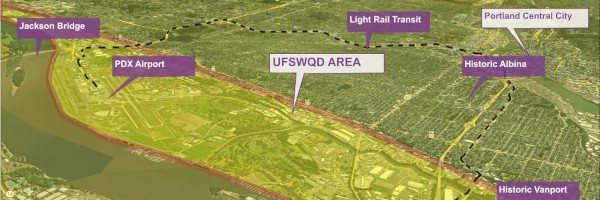Community Engagement and Resilience Program
| Community Engagement and Resilience Program | |
|---|---|

| |
 Urban Flood Safety & Water Quality District | |
| Team Organizations | Green Urban Design |
| Team Leaders | Wilfred Pinfold |
| Participating Municipalities | Portland OR |
| Status | Concept"Concept" is not in the list (Launched, Implemented, Development, Ready for Public Announcement, In Deliberations, Negotiations, Concept only Stage, Master Planning) of allowed values for the "Status" property. |
| Document | None |
Description
The Green Horizons Initiative for the Urban Flood Safety & Water Quality District (UFSWQD) aims to address the pressing challenges faced by economically disadvantaged and environmentally vulnerable communities in Portland's District 1 and 2 Neighborhood Coalitions. These communities, home to diverse, low-income populations, struggle with limited access to jobs, essential services, and face environmental hazards such as air pollution and lack of green spaces. The program seeks to empower local residents and businesses by providing workforce training in sustainable fields like vehicle electrification, energy efficiency, and urban design, while also fostering community-led engagement to improve resilience and promote equitable economic opportunities. Through workshops, cultural competency training, and digital platforms, the program will engage these communities in climate action and environmental justice, aiming to reduce carbon emissions, support infrastructure improvements, and ensure that the benefits of climate resilience are shared equitably.
Challenges
The challenges of the Green Horizons Initiative project lie in addressing the deep-rooted economic instability, environmental vulnerability, and historical injustices faced by the communities within the Urban Flood Safety & Water Quality District (UFSWQD). These communities, already grappling with limited access to jobs, essential services, and environmental hazards, face significant barriers in engaging with government processes and decision-making, often due to historical mistrust and cultural differences. Additionally, the area’s carbon-intensive industries present a major hurdle in transitioning to a sustainable, low-carbon economy. Overcoming these challenges will require effective community outreach, capacity-building, and collaboration with diverse stakeholders, while ensuring that the benefits of climate resilience and economic opportunities are equitably distributed without exacerbating gentrification or displacement.
Solutions
The proposed solutions to the challenges faced by the Green Horizons Initiative include a multi-faceted approach centered on community empowerment, capacity-building, and fostering collaboration. To address the lack of engagement and historical mistrust, the program plans to host community-led workshops focused on cultural competency and historical awareness, ensuring government representatives are trained on the unique histories and needs of the UFSWQD communities. The initiative will also establish dedicated communication channels, including digital platforms for real-time feedback, and formal partnerships with local organizations to ensure ongoing dialogue between community members and government bodies. To tackle economic and environmental challenges, workforce training programs will be implemented in sustainable fields such as vehicle electrification, energy efficiency, and urban design, helping local businesses transition to low-carbon practices. Additionally, the program will offer financial incentives, technical support, and co-created policy recommendations, aligning with both community needs and Oregon’s broader climate goals, ensuring that the benefits of climate resilience and economic opportunities are shared equitably and prevent displacement.
Major Requirements
The requirements for the Green Horizons Initiative project include securing strong partnerships with local community organizations, businesses, and government entities to ensure effective collaboration and community engagement. Key requirements involve the establishment of dedicated communication platforms, such as digital tools for feedback and information sharing, as well as the development of culturally inclusive materials and language support to overcome barriers of access. The project also requires the creation and delivery of tailored training programs focused on workforce development in sustainable industries like vehicle electrification, energy efficiency, and urban design. Additionally, formal partnership agreements, including regular advisory meetings and check-ins, are necessary to maintain ongoing dialogue between stakeholders. A dedicated community liaison, along with historical and cultural awareness training for government representatives, will be crucial to ensuring effective engagement and addressing the long-standing environmental and economic challenges faced by UFSWQD communities.
Performance Targets
| Key Performance Indicators (KPIs) | Measurement Methods |
|---|---|
|
|
Standards, Replicability, Scalability, and Sustainability
{{{standards}}}
Cybersecurity and Privacy
{{{cybersecurity}}}
Impacts
{{{impacts}}}
Demonstration/Deployment
{{{demonstration}}}